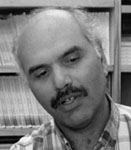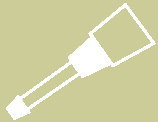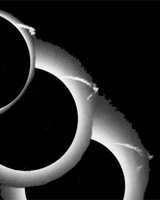|
Steve Edberg
–
astronomer
|

|
"
My process of creation starts with wanting to share with others, seeing a need, or seeing a possible improvement.
" |

|
| |
|
|
|
| |
How were you motivated to choose your particular field? |
| |
To this day, more than 30 years after I decided on astronomy for a career, I still don't know what might have specifically led me on this path. My parents joke that a trip to Palomar Observatory when I was 14 months old is what started it (we have the picture to prove it but I don't remember the trip). I do remember looking, at age 4½, for one of the bright comets of 1957 with my Dad from our backyard (we didn't see it). Through childhood I had telescopes and used them on and off, but it wasn't until pre-9th grade summer school that I was hooked. While reading a book on meteors and meteorites by Lincoln Lapaz (instead of doing the research I was supposed to be doing for the class), I decided that this was extremely interesting. By the time I was actually in 9th grade, my interest had evolved into astronomy in general. I borrowed the school's 10-inch telescope to "fix it up" over Christmas vacation (a great excuse to have it to use!) and bought my own similar 10-inch telescope (so my poor mother had to put up with both in the living room for a while).
Astronomy is where my interest has stayed, though with some twists and turns along my career path. Starting with volunteer help at the library in Pasadena of what is now called the Carnegie Observatories, I went on to summer jobs in astronomy after high school and through college and graduate school. My intention to become a great cosmologist converted to work in solar physics and then comets and, to this date, remote sensing of planetary surfaces and science education.
|
|

|
| |
|
|
|
| |
What can you share about your creative process? |
| |

|
|
The works I produce come in two categories: those in photography which I "trap" in my camera, and those which I consciously create, either in writing or in my workshop. Images I capture on film, that I consider artistic or beautiful, are most often the result of being in the right place at the right time. Especially in landscape photography, I rarely set up a picture I want; rather, I am fortunate to be blessed with a good eye for composition and a good sense of beauty in the outdoors. Even for scientific photography, advance knowledge and planning and obvious composition don't ensure a good image. Being there to catch the view is important - one must be out and about, an aware observer of the world around oneself, to find the opportunities. In that sense, one makes one's own luck.
In my writing, which is all non-fiction, my goal is to share what I know with others, to inspire interest and excite readers the way I am excited about the subject. Whether the subject is a natural phenomenon or instructions for doing a science experiment, my goal is to share the joy of understanding with the reader, explain how it works, and get the reader to go out and learn more, and to do it as plainly and correctly as possible.
The creative process for software or in my workshop is one of identifying a problem and then devising the best solution to it. In the workshop I face the limitations of the tools and materials I have easy access to. Often the construction process, "puttering", means searching through my "junk" drawers (my wife just doesn't understand that one man's trash is another man's treasure) until the right combination of potential parts presents itself. Then it may be hours of work to turn potential parts into a finished product.
My process of creation starts with wanting to share with others, seeing a need, or seeing a possible improvement. It helps for the problem to be intriguing and I must want to solve it. When I want to share, writing or speaking is involved. Very often, when I already have the necessary background knowledge, the work writes itself in a rush of words that is hard to stop.
My process for invention (and sometimes for sharing) often requires cogitation time. Sometimes it is short, standing over the junk drawer picking out parts before construction begins. Sometimes it takes days or weeks, when ideas rattle around in the back of my mind without conscious acknowledgement or during private times such as on my bicycle commute when I have time to think. Finally, an "aha!" moment occurs and the solution presents itself. Even then, after a solution is found, I seek an elegant solution that refines it to its simplest, barest, but most complete level.
In all of this process, I think a strong, broad base of background knowledge is necessary. A sense of curiosity and wonder about the world and the wherewithal to satisfy that curiosity and collect that knowledge, from books and personal experiences, permit one to be creative.
|
|
| |
|
|
|
| |
What ideas do you have for a future human community on Mars?
|
| |
My first reaction to this question was "explore, explore, explore". The members of this community must not get bogged down in simply trying to survive and conduct pre-programmed experiments. They must have the desire to want to know what is over the next hill and beyond the horizon, to reach the tops of the highest mountains and the floors of the lowest valleys, and to seek the poles. The time and materiel must be present to permit free play, i.e., exploration without bureaucratic impediments. This, I believe, is the essence of humanity's push forever outward.
The library of this community should include the works of Ansel
Adams and other nature photographers and writers such as John Muir,
Henry David Thoreau, Mark Twain, and Thomas Hornbein (Everest:
The West Ridge) to help provide inspiration, should that be
necessary.
|
|

|
|




